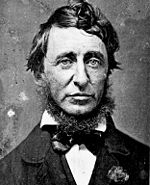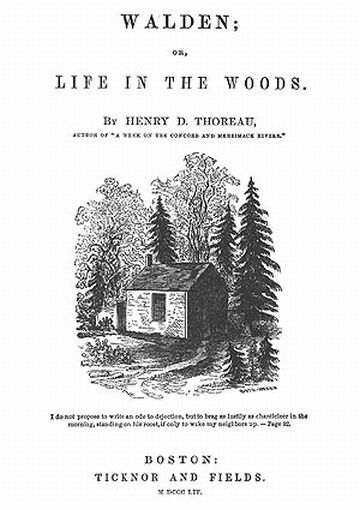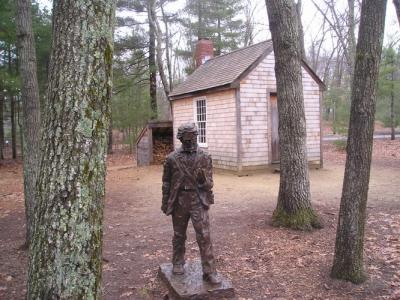Walden
From 1850s
Contents |
[edit] Walden
[edit] Henry David Thoreau
"He is as ugly as sin, long-nosed, queer-mouthed, and with uncouth and rustic, though courteous manners, corresponding very well with such an exterior. But his ugliness is of an honest and agreeable fashion, and becomes him much better than beauty."
-Nathaniel Hawthorne, American Notebooks
Born David Henry Thoreau in Concord, Massachusetts, on July 12, 1817 to John and Cynthia Thoreau. His father was a successful pencil manufacturer. In 1833 he attended Harvard College. He briefly taught school in Canton, Mass. for a year in 1835. In 1837 Thoreau met lifelong friend, Ralph Waldo Emerson. For Thoreau, Emerson would become "a teacher, an intellectual and spiritual advisor, and perhaps something of a father and an older brother as well" (Cain 16). It was Emerson who encouraged Thoreau to begin keeping a journal. Emerson also introduced Thoreau to his contemporaries in the Transcendental Club, including Margaret Fuller and Bronson Alcott.
After graduating from Harvard, Thoreau took up several brief teaching positions, including a post in 1839 with his brother, John, at the Concord Acadmey. It was there that Thoreau met, and had his proposal of marriage rejected by, Ellen Sewall. Thoreau never married. It was also in 1839 that Thoreau took a two-week trip with his brother along the Concord and Merrimack rivers. This experience would be the basis of his first book, A Week On the Concord and Merrimack Rivers published in 1849. This book, self-published by Thoreau on the advice of Emerson, was a commercial failure leaving Thoreau in debt and creating a rift between the two authors. It sold 219 out of the 1,000 copies printed. Later dubbed "one of the worst-selling books by an eventually-canonized authoer" (37).
On July 4, 1845, Thoreau began a 26 month long residence at Walden Pond, on land owned by Emerson. His experience would become one of his most famous and enduring works, Walden, published in 1854. During his stay, in July 1846, Thoreau was arrested for refusing to pay poll tax, "a tax that Thoreau argues meant giving support to the Mexican War" (35). He spent a night in jail; an experience that would later form his seminal work, Civil Disobedience, published under the title Resistance to Civil Government in 1849.
After Thoreau's initial publishing failure, he continued to write, revising and reworking several pieces. He also worked at designing and refining the graphite pencil for his father's company, of which he became the head in 1859. He also worked as a surveyor. Thoreau was involved in anti-slavery campaigning, most famously including his 1859 speech, A Plea for Captain John Brown, whom he had met in 1857.
In 1859, during a late-night nature experiment, Thoreau caught a severe cold which became bronchitis and eventually tuberculosis. Thoreau became bed-ridden and died on May 6, 1862. He was buried May 9, in a funeral attended by Hawthorne and May Alcott, with a eulogy read by Emerson.
Thoreau worked on manuscripts and papers until his death, many of which were edited and published by friends, including 14 volumes of his journal in 1906, which cemented his status in the American canon.
Source: Cain, William E. "A Brief Biography." A Historical Guide to Henry David Thoreau. Oxford University Press: 2000.
[edit] Walden; or, Life in the Woods
After leaving Walden Pond after two years, two months, and two days, Thoreau worked on the manuscript which would eventually become Walden. It initially began as a short lecture, "The History of myself", in 1847, working its way through eight versions into the final product, published on August 9, 1854, by Ticknor and Fields of Boston. Prepublication notices and excerpts from the book were placed in the Boston Transcript and the New York Evening Post by James T. Fields after William Ticknor was "not particularly enthusiastic" about publishing Walden. Horace Greeley's prepublication notice and excerpt in the New York Tribune has been said to be "of greater importance for the success of the book than any review" (Scharnhorst 115). The initial print run was for 2,000, of which 1,744 were sold within the first year. Walden retailed for one dollar, with a 15-cent royalty for Thoreau on each copy. The first edition sold out in 1859, and was reprinted in 1862, remaining in print ever since. The general response to Walden was positive, "of the sixty-six contemporary reviews that have been located, forty-six were strongly favorable" (Cain 43). The first English edition was published in 1886 by Walter Scott. The first collected edition of Thoreau’s works was published in 1894 by Houghton, Mifflin, who had bought out Ticknor and Fields.
Sources:
Cain, William E. "A Brief Biography." A Historical Guide to Henry David Thoreau. Oxford University Press: 2000.
Myerson, Joel. "Introduction." Critical Essays on Henry David Thoreau's Walden. G.K. Hall & Co: 1988.
Scharnhorst, Gary. "James T. Fields and Early Notices of Walden." The New England Quarterly: 1982.
[edit] Selected Criticism of Thoreau and Walden
- "These books spring from a depth of thought which will not suffer them to be put by, and are written in a spirit in striking contrast with that which is uppermost in our time and country. Out of the heart of practical, hard-working, progressive New England come these Oriental utterances. The life exhibited in them teaches us, much more impressively than any number of sermons could, that this Western activity of which we are so proud, these material improvements, this commercial enterprise, this rapid accumulation of wealth, even our external, associated philanthropic action, are very easily overrated. The true glory of the human soul is not to be reached by the most rapid traveling in car or steamboat, by the instant transmission of intelligence however far, by the most speedy accumulation of a fortune, and however efficient measures we may adopt for the reform of the intemperate, the emancipation of the enslaved, &c., it will avail little unless we are ourselves essentially noble enough to inspire those whom we would so benefit with nobleness."
- Anonymous – Thoreau's Walden - from the National Anti-Slavery Standard, December 16, 1854, p. 3
- "Henry D. Thoreau, the American Diogenes, if we may presume to term him so – assuredly we mean no offence – is a graduate of Harvard university, a ripe scholar, and a transcendentalist of the Emersonian school, though he goes much further than his master; his object, apparently, being the exaltation of mankind by the utter extinction of civilization....The natural sights and sounds of the woods, as described by Mr. Thoreau, form much pleasanter reading than his vague and scarcely comprehensible social theories..."
- Anonymous - An American Diogenes - from Chamber’s Journal, VIII (November 21, 1857), p. 330 -32
- "People – very wise in their own eyes – who would have every man’s life ordered according to a particular pattern, and who are intolerant of every existence the utility of which is not palpable to them, may pooh-pooh Mr. Thoreau and this episode in his history, as unpractical and dreamy."
- George Eliot - from Westminster Review 65 (January 1856) p. 302-3
- "Thoreau is cried up as being one of the greatest American writers. In reality, he was an awkward, nervous, self-conscious New Englander....The naïveté of Thoreau’s mind is incredible. At his best, he is second best. He is too cultured and not cultured enough....He is too bookish, too literary..."
- Llewelyn Powys - Thoreau: A Disparagement - from Bookman (New York) 69 (April 1929) p. 163-165
- "The structural wholeness of Walden makes it stand as the firmest product in our literature of such life-giving analogies between the processes of art and daily work....Thoreau demonstrated what Emerson merely observed, that the function of the artist in society is always to renew the primitive experience of the race..."
- F.O. Matthiessen – 'The Organic Structure of Walden' from American Renaissance: Art and Expression in the Age of Emerson and Whitman. Oxford University Press: 1941
- "In one book...he surpasses everything we have had in America."
- Robert Frost - from 'Letter to Wade Van Dore, June 24, 1922' from “Frost and Thoreau,” by Lawrence Thompson. From The Thoreau Society Bulletin, LXXXVIII (Summer, 1964), 4.
- "It may be difficult to say exactly what is being claimed, but the triumphant tone of the concluding chapters leaves little doubt that he is announcing positive results. His most telling piece of evidence is Walden – the book itself. Recognizing the clarity, coherence, and power of the writing, we can only conclude – or so transcendental doctrine would have it – that the experiment has been a success. The vision of unity that had made the aesthetic order of Walden possible had in turn been made possible by the retreat to the pond. The pastoral impulse somehow had provided access to the order latent in the cosmos."
- Leo Marx - from The Machine in the Garden: Technology and the Pastoral Ideal in America. Oxford University Press: 1964
- "May 6th is the saddest day in the year for us, as it is the day of Thoreau’s death – a grief from which we have not recovered. Henry Thoreau has probably been more wildly misconstrued than any other person of comparable literary stature. He got a reputation for being a naturalist, and he was not much of naturalist. He got a reputation for being a hermit, and he was no hermit. He was a writer, is what he was. Many regarded him as a poseur. He was a poseur, all right, but the pose was struck not for other people to study but for him to study – a brave and ingenious device for a creative person to adopt. He posed for himself and was both artist and model, examining his own position in relation to nature and society with the most patient and appreciative care. Walden is so indigestible that many hungry people abandon it because it makes them mildly sick, each sentence being an anchovy spread, and the whole thing too salty and nourishing for one sitting."
-E.B. White - Henry Thoreau from The New Yorker (May 7, 1949), p. 23
[edit] Walden Pond
Walden Pond is located in Concord, Massachusetts.
Statue of Thoreau in front of replica of cabin.
[edit] Resources
The Thoreau Society - Founded in 1941, it is the oldest and largest organization devoted to an American author and is dedicated to promoting Thoreau's life and works through education, outreach and advocacy.
The Thoreau Reader - The annotated works of Henry David Thoreau.
Wikipedia Entry on Thoreau - Includes biographical and bibliographic details.
The Walden Woods Project - Preserves the land, literature and legacy of Thoreau to foster an ethic of environmental stewardship and social responsibility.
Fiddlersgreen - Build your own reconstruction of Thoreau's cabin out of paper.





